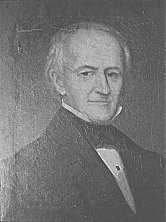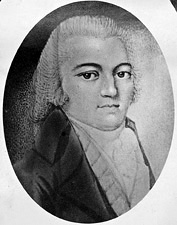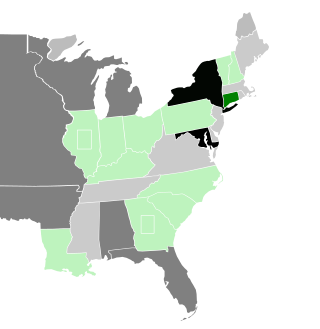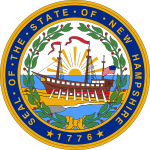
The General Court of New Hampshire is the bicameral state legislature of the U.S. state of New Hampshire. The lower house is the New Hampshire House of Representatives with 400 members. The upper house is the New Hampshire Senate with 24 members. This ratio of 1 Senate seat for every 16.67 House seats makes New Hampshire's ratio of upper house to lower house seats the largest in the country.

William Plumer was an American lawyer, Baptist lay preacher, and politician from Epping, New Hampshire. He is most notable for his service as a Federalist in the United States Senate (1802–1807), and the seventh governor of New Hampshire as a Democratic-Republican.

The New Hampshire House of Representatives is the lower house in the New Hampshire General Court, the bicameral legislature of the state of New Hampshire. The House of Representatives consists of 400 members coming from 203 legislative districts across the state, created from divisions of the state's counties. On average, each legislator represents about 3,300 residents, which is the smallest lower house representative-to-population ratio in the country.
The 1818–19 United States House of Representatives elections were held on various dates in various states between April 26, 1818 and August 12, 1819. Each state set its own date for its elections to the House of Representatives before the first session of the 16th United States Congress convened on December 6, 1819. They occurred during President James Monroe's first term. Also, newly admitted Alabama elected its first representatives in September 1819, increasing the size of the House to 186 seats.

Samuel Bell was an American politician and lawyer who served as the eighth governor of New Hampshire from 1819 to 1823, and as the United States Senator for New Hampshire from 1823 to 1835.

Henry Hubbard was a member of the United States House of Representatives from 1829 to 1835, a Senator from New Hampshire during 1835 to 1841, and the 18th governor of New Hampshire from 1842 to 1844.

John Fabyan Parrott was a United States representative and a Senator from New Hampshire.
Mark Langdon Hill was United States Representative from Massachusetts and from Maine. He was born in Biddeford on June 30, 1772. He attended the public schools, then became a merchant and shipbuilder in Phippsburg. He was an overseer and trustee of Bowdoin College. He is the nephew of John Langdon. New Hampshire governor, Senator and patriot.
Benjamin Orr was a member of the United States House of Representatives from Massachusetts.

Austin Franklin Pike was a United States representative and Senator from New Hampshire. Born in Hebron, New Hampshire, he pursued an academic course, studied law, and was admitted to the bar of Merrimack County in 1845. He was a member of the New Hampshire House of Representatives from 1850 to 1852 and in 1865–1866, and served as speaker during the last two years. He was a member of the New Hampshire Senate in 1857–1858, serving as president the last year.

Clement Storer was a United States representative and Senator from New Hampshire. Born in Kennebunk in Massachusetts Bay's Province of Maine, he completed preparatory studies, studied medicine in Portsmouth, New Hampshire and in Europe, engaged in the practice of medicine in Portsmouth, and was captain of militia and held successive ranks to that of major general.
Ichabod Bartlett was an American politician and a United States representative from New Hampshire.

William Merchant Richardson was a member of the U.S. House of Representatives from Massachusetts and chief justice of the New Hampshire Supreme Court.

Richard Fletcher was a member of the United States House of Representatives from Massachusetts. The brother of Governor Ryland Fletcher, he was born in Cavendish, Vermont on January 8, 1788. He pursued classical studies and graduated from Dartmouth College in 1806. He taught school in Salisbury, New Hampshire, studied law, was admitted to the bar and commenced practice there.

Abijah Bigelow was a U.S. Representative from Massachusetts.
David Barker Jr. was an American politician and a U.S. Representative from New Hampshire.

William Plumer Jr. was an American politician, attorney, and author from New Hampshire. He was most notable for his service in the United States House of Representatives from 1819 to 1825.
John Wilson was a U.S. Representative from Massachusetts.

The 1818–19 United States Senate elections were held on various dates in various states. As these U.S. Senate elections were prior to the ratification of the Seventeenth Amendment in 1913, senators were chosen by state legislatures. Senators were elected over a wide range of time throughout 1818 and 1819, and a seat may have been filled months late or remained vacant due to legislative deadlock. In these elections, terms were up for the senators in Class 3.

The 1819 New Hampshire gubernatorial election was held on March 9, 1819.
This page is based on this
Wikipedia article Text is available under the
CC BY-SA 4.0 license; additional terms may apply.
Images, videos and audio are available under their respective licenses.












